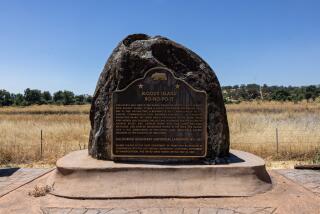Battle to Rename Texas Town’s Road Turns Into War of Words : Teacher’s fight to change ‘Jap Road’ angers some longtime residents, who say it honors the area’s Japanese settlers.
- Share via
FANNETT, Tex. — Rice fields still flourish in this rural community, a reminder of the Japanese farmers who immigrated to the Texas Gulf Coast in the early 1900s.
A four-mile country lane on the edge of town is a remembrance of a different sort. Its name: Jap Road.
For more than a year, Sandra Nakata, a schoolteacher from nearby Beaumont, has worked to rename the road, infuriating Fannett residents who insist the road honors the Japanese settlers.
Says Nakata: “ ‘Jap’ has always been derogatory and offensive. . . . It’s unbelievable that people are fighting (a name change).”
“It isn’t a racial slur,” said Ima Thornton, 85, whose family still owns some of the land sold by settler Yasuo Mayumi when he returned to Japan in 1924. “The Mayumis would introduce themselves as ‘the Japs from Jap Road.’ We admired these kind and gentle men. . . . If you change the name, you erase the history of the road.”
Because neither side is budging and a county commissioner with the authority to change the name is reluctant to upset some constituents, the issue of the road could end up before the Texas Legislature. Nakata said she hopes to broaden a law that prohibits naming public property in a way that slurs blacks.
The Jefferson County Commissioners Court could decide to rename the road, but that appears unlikely. “The majority do not want a change, so I don’t feel comfortable mandating it,” said Commissioner Mark Domingue.
“People in the community became alienated when people from the outside said how ignorant they are, how derogatory the name is, when in fact the Japanese were held in very high regard. . . . People don’t like to be told what to do by outside people who don’t know the history of the road,” he said.
Japanese farmers began migrating to Texas in the early 1900s, attracted by land ideal for rice farming. Texans welcomed them and the economic development the rice fields represented.
In 1906, a wealthy banker named Yoshio Mayumi started a rice farm on 1,734 acres of land near Fannett. Eventually, his brother, Yasuo, joined him.
According to local legend, the Mayumis were asked, as an honor: “ ‘How would you like to have this road named after y’all,’ ” said Fannett resident Pansy Wingate, 85. “So it was named Jap Road. There wasn’t anything to it.”
When Nakata, who grew up in southern Texas, moved to Beaumont, she was bothered by billboards for a popular seafood restaurant that promoted its location “off of Jap Road.”
But radio ads for the restaurant were the last straw. “The announcer screams it out: ‘Jaaap Road!’ ” Nakata said. “I had to do something. How could I teach my students to stand up for what they believe in when I didn’t do it myself?”
In the last year, Nakata has spoken before the commissioner’s court, written opinion pieces for the Beaumont Enterprise newspaper and met with local residents about changing the road’s name.
She said some residents responded with phone calls inviting her to “go back to Japan”--she now has an unlisted number--and harsh letters to the editor of the newspaper.
One said: “Poor Sandra Nakata. The name of Jap Road offends her. I wonder how all the families touched by the deaths of loved ones in the destruction of Pearl Harbor by her countrymen feel.”
Nakata, a third-generation Japanese American, says that “people keep forgetting I’m an American. I haven’t even been to Japan.”
Nakata’s fight has drawn letters of support from the Anti-Defamation League and the U.S. Justice Department. The American Civil Liberties Union says that it stands ready to file suit.
Says Betty Waki, president of the Japanese American Citizen League’s Houston chapter: “If we’re going to honor these families, let’s honor them by putting their names on the road and call it Mayumi Road. Instead it’s ‘We honored that guy--what was his name--that little Jap?’ ”
Wingate speaks for many in Fannett when she says that she doesn’t think the word is a slur. “We think this (controversy) is foolish,” she said.
Even Americans of Japanese descent who live in the area, like 38-year-old rice farmer Bill Kondo, agree.
“If it doesn’t bother people who live here, I don’t see why people from the outside should tell us: ‘You’re wrong, you’re racist, we know what’s right and we’re going to fix it for you whether you like it or not,’ ” he said.
“The road was not named in malice,” he added. “I understand in some areas ‘Jap’ is considered derogatory, but in Fannett all it is is short for Japanese.”
Longtime residents like Thornton acknowledge that the Legislature could force a change, but they say they will stick to familiar ways. “Mayumi Road, that doesn’t go at all. It’s always been Jap Road. I don’t want it any other thing. Even if they change the name, it’ll always be Jap Road to me,” Thornton said.
Nakata won’t argue with that. “At this point, all I want is the name off of the street sign,” she said.
More to Read
Sign up for Essential California
The most important California stories and recommendations in your inbox every morning.
You may occasionally receive promotional content from the Los Angeles Times.













